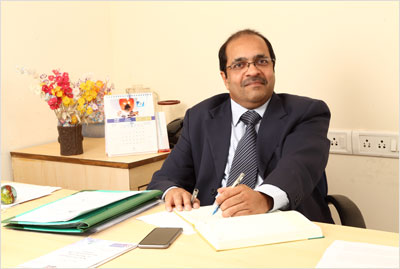Established in the year

Mr. RAJEEV GUPTA
M.M.S. (Marketing)CHIEF OPERATING OFFICER
THE CATALYST – OUR CHIEF OPERATING OFFICER,CAREER & GUIDANCE CELL
Rajeev Gupta, started his professional career as a Citibanker and later joined Standard Chartered where he was instrumental in a number of initiatives.
With the wealth of a Foreign Banking Career spanning 11 years. Rajeev joined the Indian Financial Markets in 2001.
In the Stock broking space, Rajeev worked with prominent Stock broking companies such as Religare Capital Markets Limited, Fortune Financial Services Limited & LKP Securities essentially heading the Institutional Sales Teams.
After joining LLIM in 2014, as the Chief Operating Officer of the Career and Guidance Cell, there have been process oriented changes & improvements to the functioning of the Placement Cell.
The LLIM Career & Guidance Cell this year has a final placement ratio of 90%. The inflow of recruiters has been the best ever and the training & learning programs offered to the LLIM students prior to their final placements has aided the overall numbers immensely.
With an expanded and motivated team the LLIM Career & Guidance Cell is looking forward to newer heights.
According to him ‘The new generation of students aspire to be entrepreneurs & capable leaders. The pathway to achieving this level is lined with opportunities that need to be capitalized, which can only happen with a balanced approach.’
The institute has a dedicated Career & Guidance Cell, which is in constant touch with the corporate world and essentially keeps the students informed about the requirements in different industry sectors regarding career opportunities available. It is very well supported by the Student Placement Committee. The recruiters regularly visit our campus for recruiting students every year. LLIM is a member of National Human Resource Developement Network, Mumbai Chapter.
CORPORATE SOCIAL RESPONSIBILITY
Corporate Social Responsibility
Regarding the interaction of the Institute and Community, there is a definite process in place. To highlight the same, we hold every year the following events at our Institute for the benefit of the community at large :
• Blood Donation Drive
• Yoga Camp
• Eye Check up Camp
• Thalassemia Awareness for our students
• Stem Cell Registration
• Toy Donation Drive
• Enactus
• Exhibition of Handicrafts made by handicap people
• Road Safety Campaign
• Self Defense
PLACEMENT PROCESS
The Campus Recruitment Programme facilitates the placement for the full time programmes at LLIM. The institute collects vital data from companies like Job Profile, Salary Details and other relevant details in the attached form in order to organize a smooth recruitment process.
PRE-PLACEMENT INTERACTION
This provides an opportunity to the students to learn more about the organization, their operations, future growth, job opportunities, work culture etc. This aims at matching students expectations with the companies requirement to create a win- win situation for both.
FINAL SELECTION
This depends upon the various selection techniques used by the corporates according to their recruitment procedure. After the candidates are short-listed and selected, the offer letter are to be given to the Placement Office.
For Further details, please contact:
Students are the assets of our Institute. We believe that it is our responsibility to mould them in such a way that they become the assets of the Industry. Our students are future managers. Keeping this in mind, the students of our Institute are trained right from day one to tackle any difficult situation that they are likely to face in the future.The Institute believes that a self learning attitude of the students is the key to success. Thus, we aim at developing a self learning attitude among our students rather than restricting their thoughts. This self learning attitude when coupled with theoretical knowledge helps the students to think and come out with innovative solutions thereby achieving our objects of providing the industry with our assets that would lead to their success. Following techniques are used to improve the skills of our students.
CASE STUDIES
The case study method is used to apply theory to real-life situations and to solve real problems. Through this method, students learn to be in real situations, make decisions, deal with consequences of those decisions, and learn from real mistakes. Nothing will ever replace learning from experience. The Cases (which involve real situations although names may be changed) allow the students to “simulate” real life situations when they don’t have the luxury of having years of experience. Management students use case problems and experiential exercises as “Laboratory” opportunities to experiment with real organizations in the class room settings.




